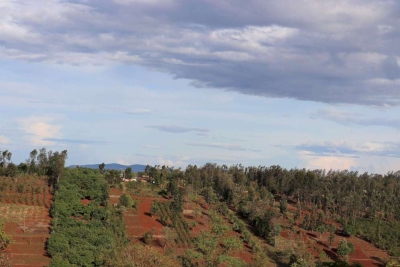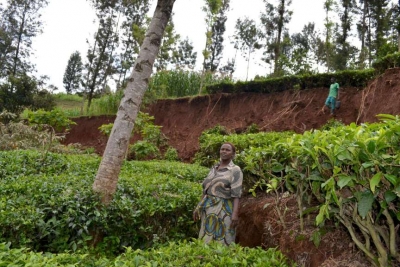
Over 4000 smallholder farmers who practice Regenerative Agriculture in Embu County have enrolled to a project that will see them start earning annual income just for having particular trees on their farms.
This comes as Africa Group of Negotiators at the ongoing climate talks in Bonn, Germany strive to come up with rules that ensure fairness in the carbon markets particularly for smallholders in less developed countries.
Through an initiative by the Dutch based Rabobank to trade Carbon Removal Units (CRUs), dubbed Agroforestry CRUs for the Organic Restoration of Nature (ACORN), 4,096 farmers from the county will soon start earning not less than 20 Euros (Sh3000) per ton of carbon stored in trees on their farms when their carbon credits get monetized.
“ACORN will remotely measure the sequestered carbon and sell the CRUs in the voluntary carbon market,” said Patrick Nyaga of Farm Africa, which is implementing the project in collaboration with the County Government of Embu.
He pointed out that a farmer with180 mix of agroforestry trees such as Glericidia, Calliandra, Sesbania, Leucaena, Acacia, fruit and nut trees on one hectare of land will stand a chance to earn at least 120 Euros (Sh18,000) per year per hectare depending on the size and type of the trees on the farm.
In this scheme, farmers will receive up to 80 percent of the sales of the CRUs where each CRU represents one ton of carbon dioxide that has been removed from the atmosphere and stored into tree biomass. The payment will be partly in cash and partly in-kind (form of seedlings or beehives).
Recent transactions in the carbon market were between 20 Euros (Sh3,000) to 31 Euros (Sh4,650) per CRU. Based on the prevailing prices, an average farmer in Embu County can sequester between zero and six CRUs per year, which translates to a maximum of Sh27,900, and a minimum or Sh18,000 for the best performing farmers.
“However, given the unique circumstances of every farmer and plot of land, no specific numbers can be given at the moment,” said Nyaga.
Carbon markets, according to the United Nations (UN) are trading systems in which carbon credits are sold and bought. A carbon credit is therefore a reduction or removal of emissions of carbon dioxide or other greenhouse gases made in order to compensate for emissions made elsewhere.
However, some African civil society activists have observed that the carbon credits are underpriced, and therefore a false solution for African smallholders. “This is a situation where these smallholders are actually being paid by someone else to carry their responsibility for polluting the environment consequently causing climate change,” Charles Mwangi, the Head of Programs and Research at the Pan African Climate Justice Alliance (PACJA) told PAMACC at the SB Climate Conference in Bonn.
“Here at PACJA, we have our reservations because if this is supposed to be a business, we believe smallholders are investing so much in terms of manpower, the cost of maintaining the trees, and most important, the foregone investments on the land were the trees are planted for the sake of carbon sequestration, yet they end up earning so little for every ton of carbon that is absorbed by the trees,” he told the Climate Action Magazine at the ongoing UN Conference on Climate Change in Bonn, Germany.
However, he noted that the only advantage is that the schemes, which also include the REDD+ are giving the African smallholders an opportunity to sustainably manage the forest ecosystems and biodiversity, but “we cannot afford to do that solely because of carbon credits,” said Mwangi.
So far, the UN reports that the current supply of voluntary carbon credits comes mostly from private entities that develop carbon projects, or governments that develop programs certified by carbon standards that generate emission reductions and/or removals.
And the demand for those carbon credits comes from corporate entities especially in the developed world who are emitting volumes of carbon, but would like to compensate for their carbon footprints. It also included corporations with corporate sustainability targets, and other actors aiming to trade credits at a higher price to make a profit.
Generally, carbon is captured from the atmosphere and stored in trees, and can only be released back to the atmosphere when the trees are burned in form of firewood or charcoal. Fruit trees can therefore store carbon for a very long time because the primary objective is to harvest fruits and nuts, and not to cut down the trees for fuel.
“In our project here in Embu, the minimum approved piece of land is 0.1 hectares, and the maximum is 10 hectares,” said Njagi.
One of the eligibility criteria is that farmers must have new agroforestry and/or existing agroforestry trees planted within the past five years, as a way of motivating farmers to plant as many trees as possible so as to increase the volume of carbon to be captured, which will be translated into cash.
To succeed in mobilising the farmers, Farm Africa engaged the services of Village Based Advisors (VBAs) – who are trained but commercially motivated private agricultural extension service providers, to do ecological zoning and to collect data from eligible participants.
“All farmer information was captured through a mobile phone App, which then relayed the data to ACORN data bank in the real-time, thereby linking the farm to remote sensing tools,” said Moses Mbogo, one of the VBAs in Embu County.
According to Muthoni Nyaga, another VBA from the area, women are currently the most proactive farmers in the project. “Most of the farmers we registered are women, and this went down well for us because ownership of the land title deed was not a must as long as the farmer can formally or informally prove that they are owners of the piece of land,” she said.
Steve Njagi, an Agricultural Officer in Embu County observed that the motivation for farmers to plant more agroforestry trees for carbon credit is a good mitigation measure for the climate emergency.
“This is in line with the government’s agenda to plant 5 billion trees as a way of combating climate change,” said Njagi.
A recent report by the Intergovernmental Panel on Climate Change (IPCC) has pointed out that greenhouse gas (GHG) emissions – which includes carbon dioxide are still rising across all major sectors globally, and this is going to have devastating impact especially on the African continent in the near future.












